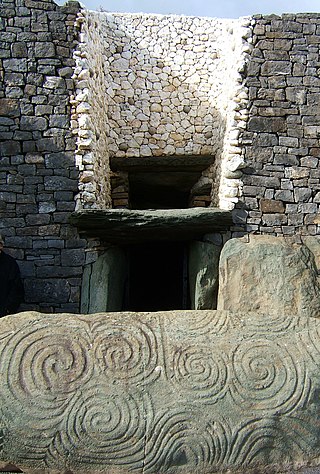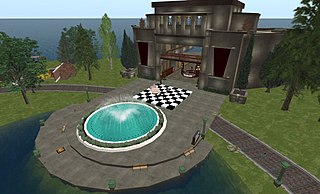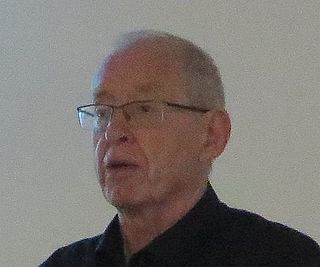
Archaeoastronomy is the interdisciplinary or multidisciplinary study of how people in the past "have understood the phenomena in the sky, how they used these phenomena and what role the sky played in their cultures". Clive Ruggles argues it is misleading to consider archaeoastronomy to be the study of ancient astronomy, as modern astronomy is a scientific discipline, while archaeoastronomy considers symbolically rich cultural interpretations of phenomena in the sky by other cultures. It is often twinned with ethnoastronomy, the anthropological study of skywatching in contemporary societies. Archaeoastronomy is also closely associated with historical astronomy, the use of historical records of heavenly events to answer astronomical problems and the history of astronomy, which uses written records to evaluate past astronomical practice.

A curator is a manager or overseer. When working with cultural organizations, a curator is typically a "collections curator" or an "exhibitions curator", and has multifaceted tasks dependent on the particular institution and its mission. The term "curator" may designate the head of any given division, not limited to museums. Curator roles include "community curators", "literary curators", "digital curators", and "biocurators".
A backlink is a link from some other website to that web resource. A web resource may be a website, web page, or web directory.
The United States of America Computing Olympiad (USACO) is an online computer programming competition, which serves as qualification for the International Olympiad in Informatics (IOI) in the United States of America. Primarily for secondary school students in the United States, the USACO offers four competitions during the academic year. Participants compete in four increasingly difficult divisions, each of which is provided a distinct set of 3 solvable competitive programming problems during each contest. Coding & submitting computer programs can be done in one of four languages: C, C++, Java, and Python. Competitors begin in the Bronze division, and advance through the levels by performing well in their current division.
WMSCI, the World Multi-conference on Systemics, Cybernetics and Informatics, is a conference that has occurred annually since 1995, which emphasizes the systemic relationships that exist or might exist among different disciplines in the fields of Systemics, Cybernetics, and Informatics. Organizers stress interdisciplinary communication, describing the conference as both wide in scope as a general international scientific meeting, and specifically focused in the manner of a subject-area conference.

The Virtual Library museums pages (VLmp) formed an early leading directory of online museums around the world.

A virtual museum is a digital entity that draws on the characteristics of a museum, in order to complement, enhance, or augment the museum experience through personalization, interactivity, and richness of content. Virtual museums can perform as the digital footprint of a physical museum, or can act independently, while maintaining the authoritative status as bestowed by the International Council of Museums (ICOM) in its definition of a museum. In tandem with the ICOM mission of a physical museum, the virtual museum is also committed to public access; to both the knowledge systems embedded in the collections and the systematic, and coherent organization of their display, as well as to their long-term preservation.
Archives & Museum Informatics is a company based in Toronto, Ontario, Canada, that organizes conferences, and undertakes consulting, publishing and training in the field of cultural heritage, especially for museums.

The Electronic Visualisation and the Arts conferences are a series of international interdisciplinary conferences mainly in Europe, but also elsewhere in the world, for people interested in the application of information technology to the cultural and especially the visual arts field, including art galleries and museums.
The European Symposium on Algorithms (ESA) is an international conference covering the field of algorithms. It has been held annually since 1993, typically in early Autumn in a different European location each year. Like most theoretical computer science conferences its contributions are strongly peer-reviewed; the articles appear in proceedings published in Springer Lecture Notes in Computer Science. Acceptance rate of ESA is 24% in 2012 in both Design and Analysis and Engineering and Applications tracks.

Vanda Vitali is an international museum executive. She was executive director and the Chief executive of the Canadian Museums Association from 2019 through 2021. She has been director and chief executive at the Auckland Museum in Auckland, New Zealand, from 2007 through 2010, the first and only woman ever appointed to that role. She was vice president, public programs and director, content development at the Natural History Museum of Los Angeles County, in Los Angeles, California, from 2002 to 2007.
SC, the International Conference for High Performance Computing, Networking, Storage and Analysis, is the annual conference established in 1988 by the Association for Computing Machinery and the IEEE Computer Society. In 2019, about 13,950 people participated overall; by 2022 attendance had rebounded to 11,830 both in-person and online. The not-for-profit conference is run by a committee of approximately 600 volunteers who spend roughly three years organizing each conference.
Sergiu Musteață is a historian from the Republic of Moldova and Dean of History and Geography Faculty, "Ion Creangă" State Pedagogical University.

Museum informatics is an interdisciplinary field of study that refers to the theory and application of informatics by museums. It represents a convergence of culture, digital technology, and information science. In the context of the digital age facilitating growing commonalities across museums, libraries and archives, its place in academe has grown substantially and also has connections with digital humanities.
Said Hadjerrouit is a professor of informatics and computer science at the University of Agder in Kristiansand, Norway. He got a doctoral degree (Dr.Ing) in 1992 in the field of medical expert systems and artificial intelligence, and a master's degree (1985) in software engineering from the Technische Universität Berlin, Germany. His teaching in Berlin focused mostly on informatics and society, philosophical and ethical issues of computing, and computers in developing countries. In 1991, he moved from Berlin to Kristiansand, Norway, and worked at the Institute of Electronic Data processing at the University of Agder. In 1994, he moved to the Institute of Mathematical Sciences at the same university, where he was appointed as an associate professor for teaching object-oriented programming, Web engineering, software development, and databases. From 2004, his work shifted to didactics of informatics and computer science education, ICT in mathematics education, ICT-enhanced learning, Web-based learning resources, social software, and Web 2.0 technology. In 2008, Hadjerrouit made a major shift in his research focus from didactics of informatics and Computer Science to mathematics education and use of digital tools in teaching and learning mathematics. He has been teaching the doctoral course “Theories in the Learning and Teaching of Mathematics” since 2014. He is also supervising two PhD students in the field of Flipped Classroom and documentational approach to mathematics education. Hadjerrouit has more than 140 publications in international journals and conference proceedings. He was awarded for Best Paper at Society for Information Technology and Teacher Education Conference in San Diego, California, United States, and IADIS e-Society conference 2012 in Berlin, Germany.

The International Conference on Computational Intelligence Methods for Bioinformatics and Biostatistics (CIBB) is a yearly scientific conference focused on machine learning and computational intelligence applied to bioinformatics, biostatistics, and medical informatics.

The NPL network, or NPL Data Communications Network, was a local area computer network operated by a team from the National Physical Laboratory (NPL) in London that pioneered the concept of packet switching.
The International Conference on Business Process Management is an academic conference organized annually by the BPM community. The conference was first organized in 2003 Eindhoven, Netherlands. Since then the conference has been organized annually. The conference is the premium forum for researchers, practitioners and developers in the field of Business Process Management (BPM). The conference typically attracts over 300 participants from all over the world.
The International Conference on Concurrency Theory (CONCUR) is an academic conference in the field of computer science, with focus on the theory of concurrency and its applications. It is the flagship conference for concurrency theory according to the International Federation for Information Processing Working Group on Concurrency Theory. The conference is organised annually since 1988. Since 2015, papers presented at CONCUR are published in the LIPIcs–Leibniz International Proceedings in Informatics, a "series of high-quality conference proceedings across all fields in informatics established in cooperation with Schloss Dagstuhl –Leibniz Center for Informatics". Before, CONCUR papers were published in the series Lecture Notes in Computer Science.
Elizabeth 'Liddy' Nevile is an Australian academic and a pioneer in using computers and the World Wide Web for education in Australia. In 1989-1990 she was instrumental in establishing the first program in the world that required all students to have laptop computers, at Methodist Ladies College, Melbourne, Australia.










